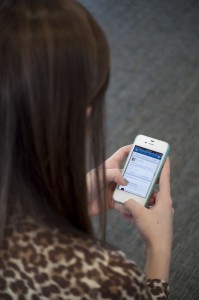
Utahns are now getting the majority of their political news digitally, according to a new Dan Jones and Associates study.
The study shows that about 39 percent of Utahns get their news from Internet news sites and 31 percent get it from TV.
Experts were not surprised by the findings. According to Kristoffer Boyle, a BYU communications assistant professor, traditional news readership has been declining for quite some time, however “that downward trend has just about leveled off.”
According to Boyle, the introduction of digital media, especially social media, has helped to engage consumers by creating competition among outlets in breaking interesting news stories.
The Jones study reveals that about 6 percent of Utahns get their political news from social media. This means nearly 76 percent of Utahns get their political news through digital channels (Internet, TV and social media).
“I have my phone with me all the time, so I’m able to constantly check for updates,” said Daniel Rich, 22, a Utah native and marketing major. “I get the news I want when I want it.”
When asked why he likes to watch the news, Rich responded, “Watching multiple networks cover the same story allows me to get both sides of every issue and it’s convenient as I’m able to watch it in my own home on my own time.”
Only 11 percent of people said they get their news from newspapers.
The results regarding millennials are even more striking, Jones further probed newspaper readership and found that only 3 percent of Utahns ages 18-24 say they get their political news from newspapers whereas nearly half — 48 percent — get their news from Internet news sites.
“I hate spending more time staring at a computer screen,” said Stanley Dillon, 22, a sophomore majoring in applied statistics. “Reading the paper is easier on my eyes and it still gives me all the news that I want.”
Similarly, Katy Smith, 21, a sophomore majoring in political science, says she reads the paper because she feels that the information printed in the physical papers are what is most important and relevant to her. “If they are going to make the effort to print a story, I’m usually going to make the effort to read it.”
Despite these advantages of print, experts such as Philip Meyer, in his 2004 book “The Vanishing Newspaper,” predicts that the final copy of the last newspaper will appear on somebody’s doorstep one day in 2043.




